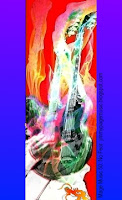~ Gerd Ziegler, Tarot: Mirror of the Soul: Handbook for the Aleister Crowley Tarot
Mage Music 50
 |
By far the most certain impediment to successful Magick is fear. Together with its other insidious incarnations (doubt, worry, panic, hate, anger and the full spectrum of negative emotions), fear inhibits the process of Magick. Fear in itself isn't a bad thing - after all, negative emotions are meant to be a natural and useful part of the human survival mechanism - however, if negative emotions are present during Magickal process, they will impact the outcome in ways that are most likely not desired. In other words, what a Mage fears, dreads, hates or is just plain worried about will be included in what the Universe delivers.
We all know about this - that's why we don't look in the closet where the Bad Thing is hiding, and why we don't talk about the monster that is under the bed. We are given to know from birth that we have the power to project thought in a way that the Universe will respond to. Even if we don't purposefully use that knowledge, we still have an understanding early on that we don't want to give power to our fears by even acknowledging them. For a Mage - a person who purposefully aligns desire and will and ritual so that the Universe will respond in a specific way - allowing any undesired emotions to color the outcome can have terrible consequences.
Spiritual but not holy
Life isn't perfect and while we are spiritual beings in physical bodies that doesn't make us holy. After all, if we were, there wouldn't be any need for Magick. As it is, there are probably no humans walking around who don't experience negative emotions of some sort, no matter how evolved they are.
Going forward with Magick in the presence of negative emotion is clearly not a good idea, but negative emotions can't just be pushed through or pushed aside during a Magickal ritual as if they didn't matter. There is no benefit for Magick in carrying on in the face of fear, no point in being brave - because you can't fool the Universe. The reality a Mage manifests through Magick reflects his actuality in full, not just the good parts.
Clearly the business of dealing with fear is something that needs to take place outside of the sphere of Magick, but it must be dealt with in the same way that a mirror reflects reality - without judgment. Fear (using the term broadly to include all the negative emotions) is useful. It is a product of holding thoughts and feelings that are not congruent with specific desires, and so for the self-aware person the presence of fear can help identify more clearly the areas of the current desire that are weak. Identifying the fear rather than being ruled by it, and letting the emotion point to a more positive direction, will negate the power of the fear and strengthen the desire.
Transforming negative to positive
"In the past I used to think I was nervous but it's the adrenaline tap switching on really early." Jimmy Page, 2012 Absolute Radio interview
Jimmy Page understands how to redirect negative emotion into positive. Nerves and stage fright are no friends of any musician if those negative emotions are allowed to run amok long enough in the musician's psyche. Focusing and dwelling on negative emotions encourages reaction rather than action, and reaction to fear is not subject to conscious control. Desire and will and ritual cannot overcome involuntarilyy freezing like a deer in the headlights. A musician and/or a Mage must be in the zone, able to open to the Universe, not closed up in self-protection.
For the Mage, no fear is not the same as not having fear - it is a matter of not being ruled by fear. A successful Mage will take fear and transform it into a strength, for the Magick will faithfully reflect all that a Mage is. Practical alchemy in action.
♪ ♪ ♪
Listen to Houses of the Holy (Physical Graffiti) if you're feeling a need to be reminded to heed the music's call.





